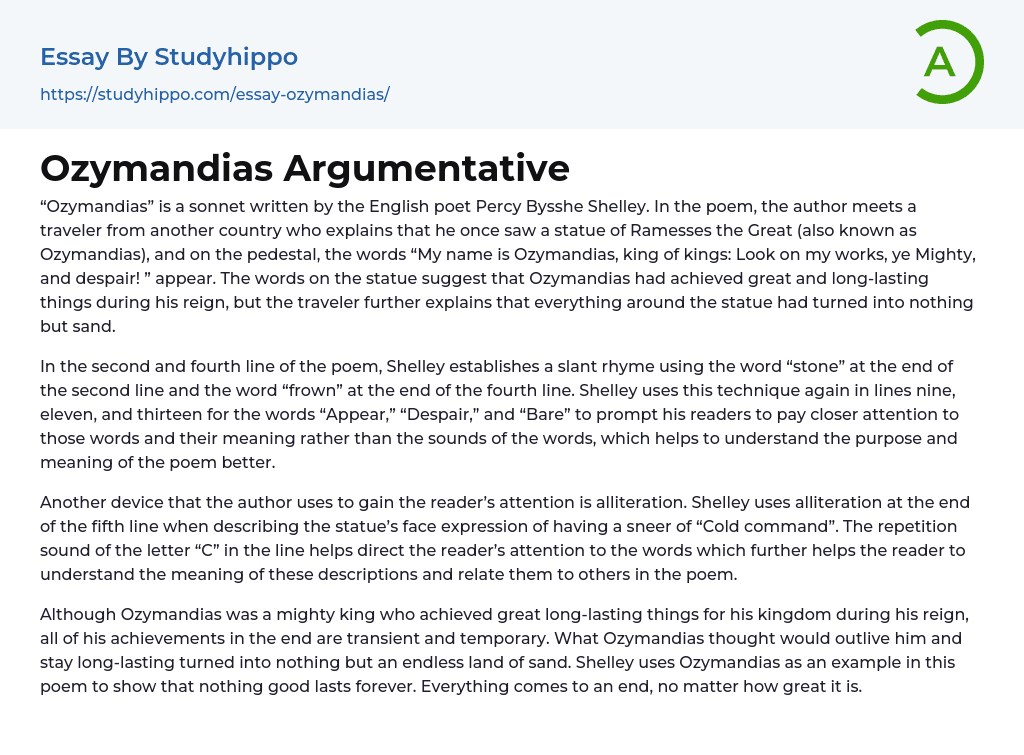“Ozymandias” is a sonnet written by the English poet Percy Bysshe Shelley. In the poem, the author meets a traveler from another country who explains that he once saw a statue of Ramesses the Great (also known as Ozymandias), and on the pedestal, the words “My name is Ozymandias, king of kings: Look on my works, ye Mighty, and despair! ” appear. The words on the statue suggest that Ozymandias had achieved great and long-lasting things during his reign, but the traveler further explains that everything around the statue had turned into nothing but sand.
In the second and fourth line of the poem, Shelley establishes a slant rhyme using the word “stone” at the end of the second line and the word “frown” at the end of the fourth line. Shelley uses this technique again in lines nine, elev
...en, and thirteen for the words “Appear,” “Despair,” and “Bare” to prompt his readers to pay closer attention to those words and their meaning rather than the sounds of the words, which helps to understand the purpose and meaning of the poem better.
Another device that the author uses to gain the reader’s attention is alliteration. Shelley uses alliteration at the end of the fifth line when describing the statue’s face expression of having a sneer of “Cold command”. The repetition sound of the letter “C” in the line helps direct the reader’s attention to the words which further helps the reader to understand the meaning of these descriptions and relate them to others in the poem.
Although Ozymandias was a mighty king who achieved great long-lasting things for his kingdo
during his reign, all of his achievements in the end are transient and temporary. What Ozymandias thought would outlive him and stay long-lasting turned into nothing but an endless land of sand. Shelley uses Ozymandias as an example in this poem to show that nothing good lasts forever. Everything comes to an end, no matter how great it is.
- American Literature essays
- Between The World and Me essays
- Book Report essays
- Book Review essays
- Book Summary essays
- Books essays
- Character essays
- Coming of Age essays
- Dante's Inferno essays
- Everyday Use essays
- Flowers for Algernon essays
- Genre essays
- Greek Mythology essays
- Incidents in The Life of a Slave Girl essays
- Letter essays
- Literary Criticism essays
- Literary devices essays
- Literature Review essays
- Metaphor essays
- Myth essays
- Play essays
- Plot essays
- Poem essays
- Poetry Analysis essays
- Protagonist essays
- Reader essays
- Reason essays
- Rhetoric essays
- Rhetorical Question essays
- Rhyme essays
- Simile essays
- Tragic Hero essays
- Translation essays
- Understanding essays
- Utopia essays
- Villain essays
- Writer essays
- 1984 essays
- A Farewell to Arms essays
- A Good Man Is Hard to Find essays
- A Hanging essays
- A Lesson Before Dying essays
- A Long Way Gone essays
- A Rose For Emily essays
- A Separate Peace essays
- A Tale Of Two Cities essays
- A Very Old Man With Enormous Wings essays
- Adventures Of Huckleberry Finn essays
- Alice in Wonderland essays
- All Quiet on The Western Front essays




